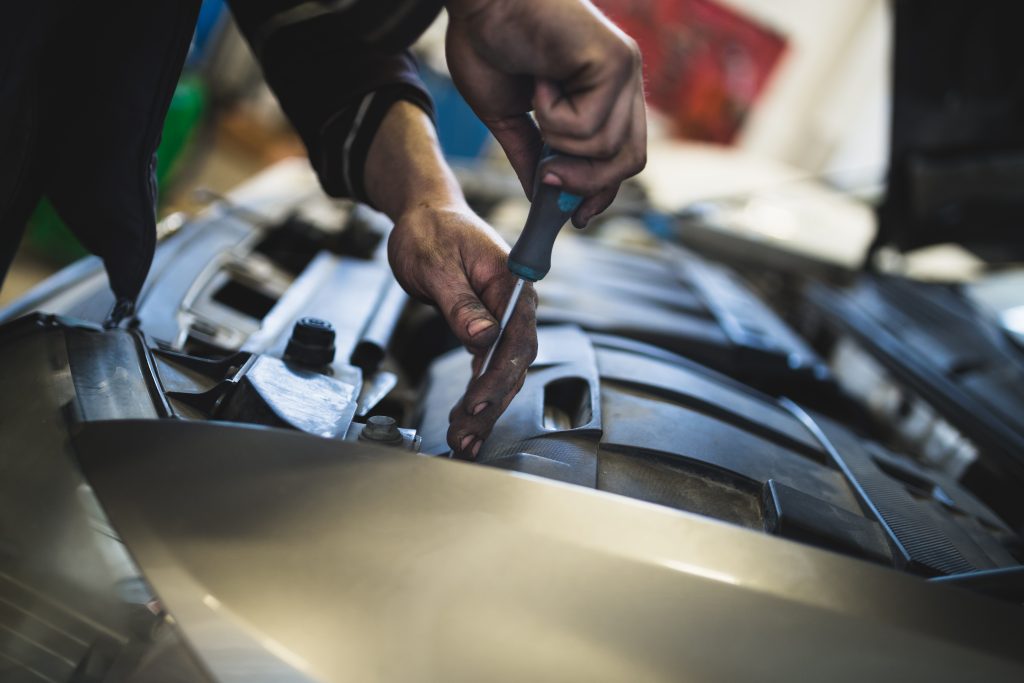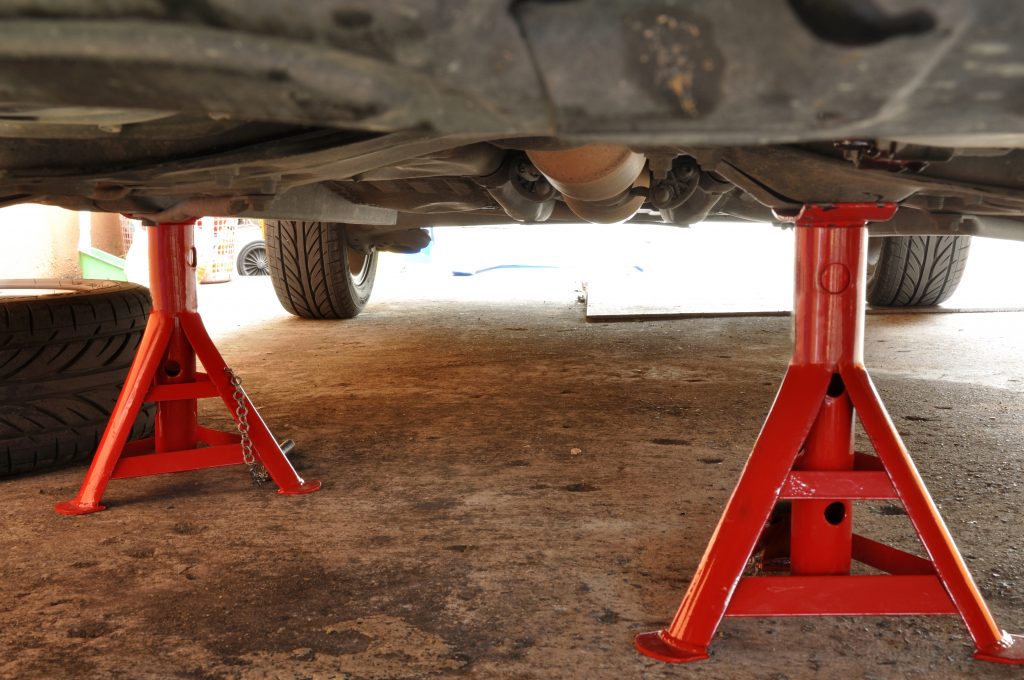Must-Have Mechanic Tools
If you’re just starting out as a do-it-yourselfer or are considering doing some automobile maintenance and want to work on your car yourself, here are some of the basic mechanics’ tools you will need to start your hobby.
Hammer
The basic tool that makes you a certified do-it-yourselfer is a hammer. Start with a basic 16-ounce claw hammer with a solid wood handle. If you want to upgrade, consider a fiberglass handled version with a padded grip. As you build your experience, you may need consider adding some specialty hammers, including:
Ball-Peen hammer: this hammer is used in metal fabrication and where precise placement of the blow is required.
2-pound maul: this is a larger hammer that can deliver a heavier blow, but still works in limited space. A maul is very handy if you are doing a lot of suspension work, which requires some pretty hard hits to separate ball joints or tie-rod ends.
Rubber or soft-blow mallet: A soft-blow hammer can deliver a blow without causing damage to the surface of the material. This hammer is often used in engine work but can be very useful in a variety of instances.
Screwdrivers
A good set of screwdrivers is mandatory to any basic tool kit. Used not only for inserting and removing screws, a good screwdriver can work as a mild pry bar and serve as drift. Look for a set with a variety of handle lengths and sizes, with both straight and Philips screwdrivers.

Pry Bar
A pry bar is necessary to help apply leverage to tighten belts or check for play in suspension joints. While not a necessity in a starter tool set, two or three pry bars in various lengths can be very useful. In a pinch, a large screwdriver or a carpenter’s crowbar will also work.
Wrenches
As with screwdrivers, investment in a good set of wrenches is valuable. Wrenches come in a variety of types and sizes, but a good start includes the following:
Combination Wrenches: Combination wrenches include a box end (enclosed) wrench on one end and an open-end wrench on the other. Look for a combination wrench set in both metric (mm) and English (inches). You should consider sets that have sizes between 8 mm and 19 mm as well as 1/4” through 13/16”. As your needs grow, you can add specialty wrenches as needed.
Adjustable Wrenches: An adjustable-end wrench is an all-around performer. Consider a three-wrench set that has 8”, 10” and 12” handle lengths.
Pliers
Another good all-around performer, pliers operate like wrenches but squeeze to grip whatever shape and size you need. A simple set of slip-joint pliers is a basic tool, but also consider adding a locking pliers, a groove-lock pliers and a needle-nose pliers. These four basic pliers will serve you well.
Ratchet and Socket Sets
For mechanic work, nothing beats a good ratchet and socket set. Ratchets and sockets are available in a variety of sizes and purposes. An advantage of ratchet and socket sets is you can start with a good set of ratchets and basic sockets and add specialty ratchets and sockets as your experience grows. For a good basic starter set, consider these:
Ratchets in 1/4” drive, 3/8” drive and 1/2” drive. If you have budget concerns, start with just a 3/8” ratchet, which will cover most of your needs, and you can upgrade to the 1/4” and 1/2” drives later.
A breaker bar is essentially a long-handled ratchet that provides much more leverage. Typically available in 3/8” and 1/2” drive sizes, if you’ve chosen to start with just a 3/8” ratchet, opt for the 3/8” drive breaker bar.
Twelve-point sockets, with both English and metric sizes, in each of the above drive sizes. Twelve-point sockets are the most useful sockets, fitting a variety of bolt styles and are easiest to work with in tight areas. However, they are not suited to heavy-duty tasks, so you may need to supplement your socket set with additional 6-point sockets. Most general socket sets also include two standard spark plug sockets in 5/8” and 13/16” sizes. If your chosen socket set does not include these, pick them up separately.
Deep socket sets are often used when a longer bolt protrudes through the nut, preventing a normal socket from fitting on the nut. While a wrench often can be used instead, sometimes a deep socket is the best solution. Consider adding both English and metric sets in all of the three drive sizes for your ratchets.
While not commonly used just a few years ago, Torx bits are growing in their use. Consider an 8-piece set that will include the most common sizes.
A torque wrench is a specialty ratchet that limits how much torque can be applied to a bolt. While not necessary in most starter sets, consider adding one if you are going to be doing a lot of engine work.
Allen Wrenches
A compact set of folding Allen wrenches, in both English and metric sizes, are a cheap and useful addition to any tool set.
Heavy Duty Scissors
Heavy duty scissors are a necessity for opening boxes, trimming plastic or weather-stripping, nipping strings and a variety of other uses.
Utility Knife
A folding or retractable utility knife with changeable blades can be used to open auto parts boxes, trim or strip wires, clean gasket cement or any of a multitude of other uses.
Flashlight
A good flashlight with a magnetic base can be very handy to light up darker areas without tying up your hands. Rechargeable and LED versions offer a bright light with a long battery life. Choose a compact light that will fit in tight areas and can be stored easily.
Oil Filter Wrench
A handheld oil filter wrench is handy for basic oil change maintenance. Be wary of the oil filter wrenches that fit on ratchets because those are typically made for specific vehicles and/or oil filter sizes. Even the adjustable-size variety won’t work on all vehicles because the oil filters are not commonly found in a location where those wrenches can be used.
Oil Drain Pan
If you are going to be doing your own oil changes, a drain pan is a must. While this can be anything from an old cake pan to a mechanic-quality reservoir with an extendable funnel, if you’re just starting out, keep it simple. Your best bet is to consider an inexpensive plastic version that includes a holder to drain the used oil.
Spark Plug Gapper
A spark plug gapper is a simple, inexpensive tool that no mechanic should be without. These are typically about a dollar and found near the checkout at most auto parts stores. You may consider picking up a couple because they can chip or nick easily, which ruins their usefulness.
Feeler Gauges
Feeler gauges are commonly used in engine work for things such as setting valve lash and measuring spark plug gaps. While not used often, feeler gauges are inexpensive and indispensable when needed.
Jack and Jack Stands
A good floor jack and a pair of jack stands are useful for lifting and holding a vehicle to allow you to work underneath. Even a simple oil change may require lifting the front of the car. Always use jack stands to support the vehicle, never the jack alone!

Wheel Wrench
A 4-way wheel wrench fits all common lug nuts and allows you to easily remove wheels from almost any light duty vehicle. The design of the wrench allows you to add extra torque to loosen even the stubbornest lug nuts.
Magnetic Dish
A magnetic dish provides a convenient place to store nuts and bolts as you remove them on a job. The magnetic base can mount the dish firmly virtually anywhere you are working and holds most nuts and bolts even in a vertical position.
Telescoping Mirror
A telescoping mirror will help you see in and around hidden areas to find that mysterious bolt you can’t see or the nut you dropped behind the wiring harness.
Volt-Ohm Electrical Meter
This device measures electrical voltage, resistance and a variety of other electronic measurements. In today’s computer-controlled cars, this is a necessity to diagnose a variety of problems with switches, sensors, activators and other electronic controls.
OBD Code Reader
These read the computerized codes that are stored in your car when something goes wrong. If you are working on any vehicles manufactured after the 1980s, a good OBD Code Reader is a necessity. Purchase the best one you can afford, and look for one that includes airbag and brake codes also.
Toolbox
Don’t forget you need a place to keep all of your tools. A good toolbox is indispensable and provides a place to not just store your tools but also keep them organized and easy to find. Look for a tool box large enough to keep all your tools and one that has storage drawers for organization.
Other Necessities
While these are not specifically tools, these items are very useful and handy to keep around:
- Electrical Tape
- Brake Cleaner Spray
- Penetrating Oil
- Good Pumice Hand Cleaner
Also, consider purchasing a good pair of mechanic’s work gloves and some disposable nitrile gloves.
This list will get you started on your basic tool set. As you gain experience and move into tougher jobs, you’ll be able to upgrade and add more specialized tools to supplement your basic set.
And if you run into a problem with your car that you can’t fix yourself, contact the pros at Neil Huffman Honda of Frankfort’s service department. You can contact Neil Huffman Honda Service Department in Frankfort at 502-385-2130 and we’ll schedule an appointment to get your car fixed and on the road again!




